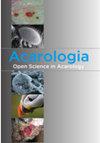Coextinction is magnifying the current extinction crisis, as illustrated by the eriophyoid mites and their host plants
IF 1.1
3区 农林科学
Q3 ENTOMOLOGY
引用次数: 2
Abstract
Coextinction is a major and growing threat to global biodiversity. One of the affected groups is the eriophyoid mites (Prostigmata: Eriophyoidea) which are highly host plant specific. They have been described from an enormous range of annual and perennial plants from grasses to giant forest trees. It is highly likely that there are huge numbers of undescribed eriophyoid species in the subtropical and tropical regions which harbor an extraordinary wealth of plant diversity. The global total of eriophyoid species is estimated to be at least 250,000 but it could be much higher. However, the continuing destruction and degradation of natural habitat, especially tropical forests, and climate change, together pose extreme, on-going threats to the eriophyoid mites because of their vulnerability to co-extinction with their host plants. It has been reported that one third of all the Earth’s plant species are now at risk of extinction. Together with enormous numbers of other invertebrate species, it is highly likely that many thousands of eriophyoid species are disappearing in the current mass extinction event. Population decline and co-extinction, especially of the invertebrates, are greatly accelerating total biodiversity losses. The termination of habitat destruction and degradation; establishment of large, representative protected areas; restoration of degraded areas; and rapid reduction of fossil fuel use, are urgent tasks. However, the long term conservation of biodiversity can only be achieved through comprehensive social, economic and political reforms across the world that prioritize environmental protection, peaceful coexistence, social justice and the sustainable use of resources.共灭绝加剧了当前的灭绝危机,如毛藻螨及其寄主植物所示
共灭绝是对全球生物多样性的一个日益严重的重大威胁。其中一个受影响的群体是角螨(propromata: Eriophyoidea),它们对寄主植物具有高度特异性。它们被描述为从一年生和多年生植物的巨大范围,从草到巨大的森林树木。亚热带和热带地区蕴藏着极其丰富的植物多样性,很可能存在大量未被描述的类蛇形植物。据估计,全球类鼻蛇类物种总数至少为25万种,但实际数量可能要高得多。然而,自然栖息地的持续破坏和退化,特别是热带森林,以及气候变化,共同对类鼻螨构成了极端的、持续的威胁,因为它们很容易与宿主植物共同灭绝。据报道,地球上三分之一的植物物种正面临灭绝的危险。在当前的大灭绝事件中,成千上万的类鼻蛇类物种极有可能连同大量其他无脊椎动物物种一起消失。种群数量的减少和共同灭绝,特别是无脊椎动物,正在极大地加速生物多样性的总体丧失。终止生境的破坏和退化;建立大型、有代表性的保护区;恢复退化地区;而迅速减少化石燃料的使用,则是紧迫的任务。然而,生物多样性的长期保护只能通过世界范围内全面的社会、经济和政治改革来实现,这些改革优先考虑环境保护、和平共处、社会正义和资源的可持续利用。
本文章由计算机程序翻译,如有差异,请以英文原文为准。
求助全文
约1分钟内获得全文
求助全文
来源期刊

Acarologia
ENTOMOLOGY-
CiteScore
2.00
自引率
18.20%
发文量
81
期刊介绍:
Acarologia is a free open-access journal. Please help us by submitting manuscripts in accordance with following instructions.
All manuscripts which do not conform to the instructions will be returned to authors without the benefit of review.
Acarologia publishes the results of original research on all aspects of Acarology.
The journal policy is that taxonomic descriptions should include several species within a same genus/family, when possible.
The editors reserve the right to refuse manuscripts when authors intentionally divide individual species descriptions of the same genus/family into distinct publications.
Single species descriptions should be clearly justified based on their scientific interest.
 求助内容:
求助内容: 应助结果提醒方式:
应助结果提醒方式:


